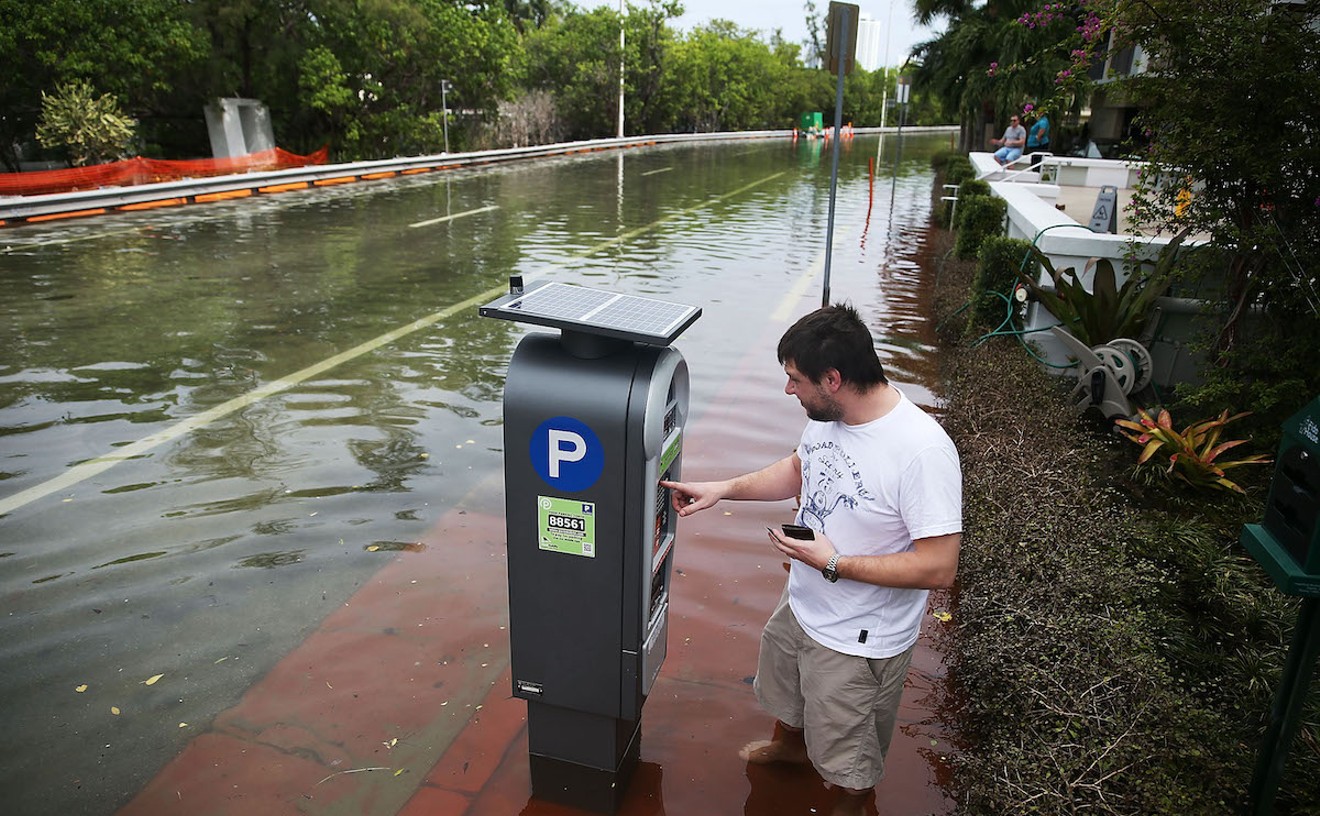Update, July 8: Miami-Dade commissioners passed the ordinance reinstating the police oversight panel with an 8-5 vote. Commissioners Esteban Bovo, Jose "Pepe" Diaz, Joe Martinez, Rebeca Sosa, and Javier Souto voted no. Commissioners Audrey Edmonson, Sally Heyman, Eileen Higgins, Barbara Jordan, Daniella Levine Cava, Jean Monestime, Dennis Moss, and Xavier Suarez voted yes.
Mayor Carlos Gimenez said during the meeting he didn't want the panel to have the power to subpoena witnesses, documents, and evidence while investigating police misconduct allegations. Gimenez previously vetoed a measure to reinstate the oversight panel in 2018. If Gimenez were to veto the measure again, votes from two-thirds of the commission would be needed to override the veto.
The killing of George Floyd by Minneapolis police opened wounds in Black communities across the U.S. and renewed cries for police reform and increased accountability for officers who act with impunity.
Throughout weeks of protests in Miami-Dade, demonstrators and activists have called for a range of changes, from defunding police departments to voting out a state attorney with a long history of failing to prosecute officers accused of gross misconduct and violence.
For years, community leaders have advocated for a review board to investigate citizen complaints against Miami-Dade police officers. Now, a measure reinstating a long-defunct civilian oversight panel will come up for a public hearing and second vote during Wednesday's county commission meeting.
"We hope the community comes out and advocates on behalf of the Independent Civilian Panel," says Barbara Jordan, the commissioner who proposed the ordinance to reinstate the panel.
The county created a police oversight panel in 1980 following riots over the killing of Arthur McDuffie and the acquittal of four Miami-Dade police officers who beat him with batons and flashlights. The panel was defunded in 2009 because of the economic recession. Jordan tried reviving the panel in 2018 and commissioners passed the measure, but Mayor Carlos Gimenez vetoed it, saying he wasn't "entirely convinced" of the need.
Commissioners gave the revived measure an initial 9-4 approval last month. Commissioners Jordan, Jean Monestime, Audrey Edmonson, Sally Heyman, Eileen Higgins, Rebeca Sosa, Xavier Suarez, Daniella Levine Cava, and Dennis Moss voted yes. Commissioners Javier Souto, Joe Martinez, Jose Diaz, and Esteban Bovo voted no.
If approved, the 13-member civilian panel would independently investigate and review complaints against officers with the Miami-Dade Police Department (MDPD). Municipalities could also request the county panel to investigate complaints against officers in a county municipality's police department. (There are 34 cities within Miami-Dade County.)
The panel would be made up of volunteers with "diverse backgrounds." Retired police officers and judges or magistrates would be considered, as would those currently working in or retired from human resources, faith-based organizations, the field of civil-rights law, or social-justice organizations.
The proposed ordinance would give panel members the authority to investigate and review allegations of misconduct and use-of-force incidents resulting in death, disability, disfigurement, or "great bodily harm." Members would also be allowed to inspect all closed MDPD internal affairs files. The panel could not discipline officers, but it could recommend discipline. The panel could also make recommendations about police department policies, procedures, training, and recruitment.
After last month's meeting, Commissioner Esteban Bovo — who is running for county mayor — issued a statement saying he had concerns about the proposed panel's subpoena power and worried that funds from the police department would be diverted to fund the panel's operations.
The proposed ordinance says panel members could issue subpoenas for witnesses, documents, and evidence related to investigations by majority vote, as long as the oversight board's investigation didn't interfere with active investigations by the State Attorney's Office, the Miami-Dade County Commission on Ethics & Public Trust, the Miami-Dade County Office of the Inspector General, or the MDPD.
The Florida Supreme Court in 2017 found it unconstitutional for the City of Miami's Civilian Investigative Panel, which investigates police misconduct, to subpoena officers who were being investigated. The court said the subpoenas violated some of the protections afforded to police by a Florida statute known as the Officer Bill of Rights. That ruling would likely apply to the county panel's subpoena powers.
Jordan's initial proposal for the panel set minimum funding at 1 percent of the Miami-Dade Police Department's budget. The commissioner tells New Times the ordinance doesn't mandate that police department money be used to fund the panel.
"It's not part of my proposal to redirect money or defund the police department," Jordan says.
She says any claim to the contrary is a "smoke-and-mirror scare tactic."
"It's up to the mayor to decide," Jordan says. "I specifically made sure I put in the item that it would be at the discretion of the mayor to decide where the money would come from."
The funding provision of the ordinance has been removed, and a substitute ordinance estimates that implementation of the panel would cost $738,000, which would include salaries for the executive director and investigative staff and a startup cost of $100,000.
Some of the Miami-Dade residents who called in to the June meeting to oppose the Independent Civilian Panel claimed it would be made up of people with no training in police practices. Jordan said that isn't true. Panel members will receive training in ethics and police encounters, perception, policies, procedures, and practices. Members could also attend training conferences.
"I want to make sure the panel can see what officers go through in having to make snap decisions," Jordan says.
Rodney Jacobs, the assistant director of the City of Miami's Civilian Investigative Panel, has helped the county model some plans after the city's oversight panel. He says civilian oversight is "catching fire" and he hopes other local governments will create their own panels or opt in to the county's.
"It should not hurt to have an additional layer of oversight," Jacobs says. "If we're all on the same page about weeding out bad policing, then this added layer of oversight should be welcomed."
Jordan says the panel is something the community needs.
"Civilian oversight gives the community a chance to have a voice," Jordan says. "To have someone who says, 'I'll listen to your complaint and investigate your complaint.'"
Participants looking to speak during the meeting can register in advance or call in live at 305-375-5777. The meeting starts at 9:30 a.m., and pre-registration for live comments closes at 10 a.m.

Audio By Carbonatix
[
{
"name": "Air - MediumRectangle - Inline Content - Mobile Display Size",
"component": "19274298",
"insertPoint": "2",
"requiredCountToDisplay": "2",
"watchElement": ".fdn-content-body",
"astAdList": [
{
"adType": "rectangle",
"displayTargets": "mobile"
}
]
},{
"name": "Editor Picks",
"component": "17482312",
"insertPoint": "4",
"requiredCountToDisplay": "1",
"watchElement": ".fdn-content-body",
"astAdList": [
{
"adType": "rectangleLeft",
"displayTargets": "desktop|tablet"
},{
"adType": "rectangleRight",
"displayTargets": "desktop|tablet|mobile"
}
]
},{
"name": "Inline Links",
"component": "18711090",
"insertPoint": "8th",
"startingPoint": 8,
"requiredCountToDisplay": "7",
"maxInsertions": 25
},{
"name": "Air - MediumRectangle - Combo - Inline Content",
"component": "17482310",
"insertPoint": "8th",
"startingPoint": 8,
"requiredCountToDisplay": "7",
"maxInsertions": 25,
"watchElement": ".fdn-content-body",
"astAdList": [
{
"adType": "rectangleLeft",
"displayTargets": "desktop|tablet"
},{
"adType": "rectangleRight",
"displayTargets": "desktop|tablet|mobile"
}
]
},{
"name": "Inline Links",
"component": "18711090",
"insertPoint": "8th",
"startingPoint": 12,
"requiredCountToDisplay": "11",
"maxInsertions": 25
},{
"name": "Air - Leaderboard Tower - Combo - Inline Content",
"component": "17482313",
"insertPoint": "8th",
"startingPoint": 12,
"requiredCountToDisplay": "12",
"maxInsertions": 25,
"watchElement": ".fdn-content-body",
"astAdList": [
{
"adType": "leaderboardInlineContent",
"displayTargets": "desktop|tablet"
},{
"adType": "tower",
"displayTargets": "mobile"
}
]
}
]












